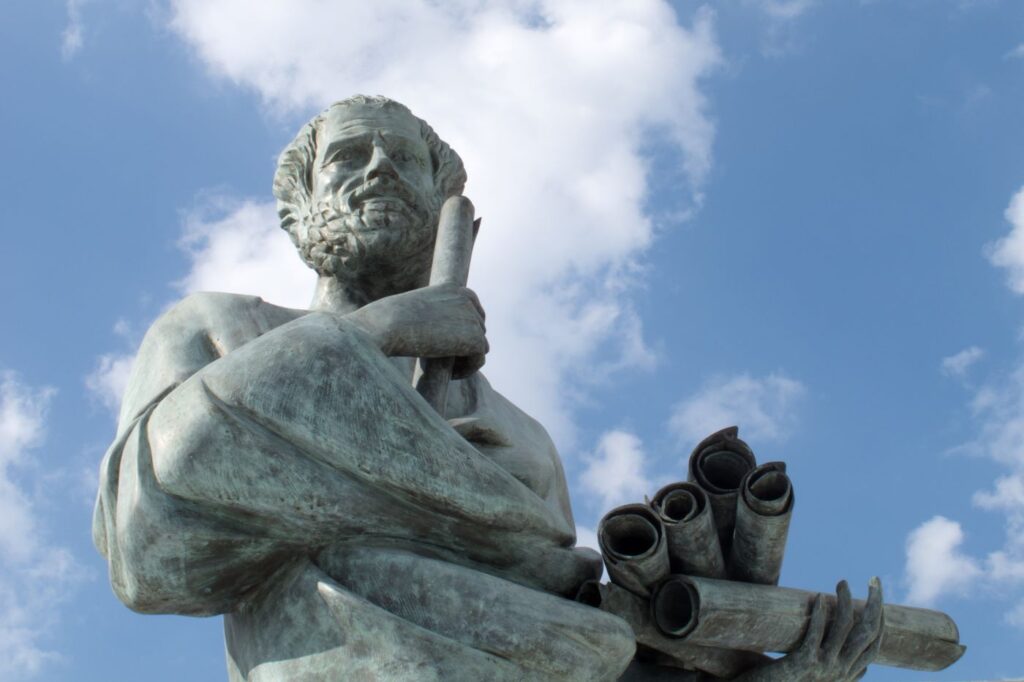Liberalism has faced recent criticism from the postliberal Right, with calls for its outright repudiation. The basis of these calls is that liberalism undermines community, religion, and morality. Other conservatives, however, are more hopeful of reinventing liberalism in a way that aligns with natural law in promoting values like marriage and family formation rather than autonomy and individualism. Then there are those who look to patriotism, personalism, and civil dialogue as antidotes to liberalism’s woes. The Right’s difficult relationship with liberalism is a choice between those who see the two as unending ideological antagonists and those who are more hopeful that liberalism and conservatism can engage in “a conversation among friends seeking truth in community.”
Conservative commentary about liberalism has mainly focused on its relationship to Christianity. What has been missing in this conversation is what classical thinkers like Aristotle have to offer. While both liberals and conservatives have explored his ethical theory, account of friendship and marriage, and analysis of faction, there has been little discussion of Aristotle’s view of piety and how it could enrich liberal politics. Mary P. Nichols, professor emerita of political science at Baylor University, fills in this gap with her book, Aristotle’s Discovery of the Human: Piety and Politics in the “Nicomachean Ethics.”
Beginning with Aristotle’s famous statement in his Politics—“Anyone who either cannot lead the common life or is so self-sufficient as not to need to, and therefore does not partake of society, is either a beast or a god”—Nichols argues that Aristotle believes human flourishing occupies a middle ground between these two extremes. People need one another to flourish. By rising above our bestial natures, that is, learning how to live with others, we discover what is most akin to the divine in ourselves. But this also requires us to accept our limitations. We are not, and cannot become, gods. “A good human life, which reflects both the virtues and the limitations of the human,” writes Nichols, “would therefore neither deny the human connection to the divine nor try to eliminate the distance between the two.”
According to Nichols, Aristotelian human flourishing requires piety, the acknowledgment that humans are akin to the divine but cannot be divine themselves. The task of the political community is to support the life of piety. Aristotle refers to the works of the statesman, in securing the good of his community, as divine, including the honors we assign to the gods. Because we can wonder at the divine, we are elevated above the beasts and consequently can deliberate, make choices, and act in forming a political community that aims at the common good. And because we do not receive our ethical virtues from nature, we must be educated and acquire them through our efforts. As Nichols writes, it is, paradoxically, our piety that leads us to discover what is truly human within us, allowing us to cultivate life-giving community.
Start your day with Public Discourse
Sign up and get our daily essays sent straight to your inbox.Whereas the moderns aspire to become gods, Aristotle’s piety limits human ambitions. He claims that we can become “blessed”—a state attributed to the gods—but only as human beings. We can think “divine thoughts,” but recognize that the source of those thoughts is outside of ourselves. The piety that emerges from Aristotle’s philosophy is “a source at the same time of confidence, on the one hand, and moderation, on the other.” Human flourishing occurs in a middle place between beasts and gods.
Aristotle’s account of piety, the relationship between the human and the divine, is perhaps best illuminated in his analysis of the highest intellectual virtue: wisdom. As Nichols states, “Our relation to the divine is not one of becoming like the divine through our activities, but one of knowing the divine, however limited our knowledge may be.” Wisdom points humans to what is higher than ourselves—as Aristotle writes, to what is “eternal, ungenerated, and indestructible.” Wisdom leads humans to seek to understand what cannot be understood. Thus, wisdom is not about the accumulation of knowledge but a longing to know the divine.
Because humans will always be imperfect beings, friendship is necessary for human flourishing. Aristotle’s treatment of friendship shows us we can only be happy when we acknowledge our own imperfections and those of others. The friendship of fellow citizens is particularly crucial because it holds cities together, with people philosophizing together and nurturing what is most divine in themselves. As pious individuals, we are aware of our limitations and imperfections—an awareness that, in turn, makes friendship and politics possible.
Nichols believes that in Aristotle’s account, piety is not only what makes us human but also provides a richer view of human nature that can support “liberal institutions and practices.” A pious understanding of what is in us akin to the divine can encourage “virtuous actions and pursuit of the truth, fostered by our thinking and acting with fellow citizens and friends.” Instead of either sinking into a subhuman existence or aspiring to become gods, Nichols calls for us to return to an Aristotelian middle ground in which we acknowledge both our humanity and our closeness to the divine.
Aristotelian piety, Nichols argues, is based on our inquiries about the divine and our distance from it. Being akin to the divine enables humans to be capable of ethical and intellectual virtue, not perfection. It is this kinship with the divine that “militates against radical secularism,” while “our distance from the divine checks moral righteousness and impositions of religious orthodoxy.” By acknowledging both our kinship with the divine and the limits of our reason, our piety leads us to discover what is human within us.
For Nichols, this can help us to “justify such liberal institutions and practices as deliberative assemblies, inclusive governing institutions, freedom of speech and religion, fostering a friendly environment for religious communities as well as prohibitions against an established church,” under the statesmanship that guides the polity toward the common good. Thus, Aristotle’s theory of piety and politics can serve as a bulwark against those who criticize liberalism as selfish, hedonistic, and morally bankrupt. What is required for liberalism is not a reform of its institutions, practices, or ideas, but “a new way to understand them,” in terms of Aristotelian piety.
Piety recognizes the foundational role the divine plays in human and political life. In this sense, Aristotle aligns with the conservative critique that liberalism requires an underlying moral and religious order to sustain itself. At the same time, Aristotle diagnoses the dangers to human freedom when the divine and human are collapsed together, e.g., as in theocracy, as some postliberals desire. Aristotle’s understanding of humans as rational and political beings separates them from both beasts and gods. According to Nichols, this view of piety “supports liberal institutions and practices that foster virtue in a way that gives new meaning to a liberal way of life.”
Such virtue, practiced within a community, is necessary for human flourishing. For example, freedom is not to be understood as individual autonomy—as someone like John Rawls writes—but rather as our choice to be drawn to the truth.
In her careful, thoughtful, and thorough analysis of Aristotle’s Ethics, Nichols shows how piety plays a central role in discovering what is the “human” in people and how such a perspective can reinvigorate liberalism. Yet one wonders whether there are limitations to what Aristotelian piety can offer to liberalism, particularly in America, where piety has always been either practiced in religion or directed at the American founding or the Constitution. The latter certainly makes no claim to the divine, while the former is an epistemological rival to Aristotelian piety. Christianity, like Judaism and Islam, is ultimately a revealed religion, unlike Aristotle’s intellectual virtue of wisdom, which is accessible through reason. And those who wish to make Aristotelian piety a manifestation of Christian natural law would have to concede that reason, in the end, only gets us so far. Piety in America has always been rooted in faith, not reason, a fact that raises questions about how transferable Aristotelian piety would be to a liberal regime like ours.
Nonetheless, Aristotle’s Discovery of the Human brings the ancients into the conservative conversation about the state of liberalism today, something that has been sorely lacking. The West’s current unease and loss of confidence in liberalism require us to revisit not only our Enlightenment and Christian heritages but also our Greek and Roman roots. By invoking Aristotelian piety, Nichols expands the horizons of the conversation about liberalism. By turning to Aristotle, she uncovers a resource for communal and moral thriving in a pluralistic liberal society.
Image by thelefty and licensed via Adobe Stock.














